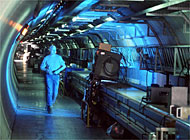
Swiss ETF Group spawns grid computing startup and raises €3mn

When CERN (European Organization for Nuclear Research) said it was investing in grid computing, Sven Lung, a business development vice president at ETF Group, a Swiss investment company that specializes in emerging technology firms, was listening.
After meeting with technology transfer unit in May of 2001, he quickly became convinced that grid computing would be the next important and disruptive phase of information technology. Grid computing is based on distributed data processing over networks to exploit computing power in a much cheaper way than traditional centralized computing systems. It also known as cluster or distributed computing.
The young executive left ETF Group and formed the startup GridXpert, quickly establishing an office in Paris and hiring ten R&D engineers. The company raised €3mn million from four investors this month, including ETF Group. The other investors are AGF Private Equity, the Fonds de Co-Investissement pour les Jeunes Entreprises (Caisse des Dépôts Group) and Innovacom.
Lung told Swiss Venture Update that grid computing will provide a “meta-operating system” for future enterprise applications and web services, a new category of Internet applications, will be the first category to exploit it.
GridXpert aims to provide a “key piece of the technology puzzle” for grid computing. The startup has two main products under development. One product is a Grid Portal to enable engineers to access applications and install them on their infrastructure. The second product is a software module to enable management, administration, and security for grid computing targeted at the enterprise market.
The sales cycle will follow a three phase process according to Lung: an audit, followed by pilot phase, and if it is proven that a substantial return on investment is possible, then follows the implementation phase.
GridXpert has a number of pilot customers that it is currently in the auditing phase with whose names will be announced in October 2002.
Grid computing is being introduced slowly into industry but is seeing more rapid uptake in the research sector, particularly it is being used for scientific calculations in physics, biology, or astrophysics, simulations in the aerospace and automotive industries, or graphic modeling. It has been popularized in the minds of computer and Internet users by programs such as the SETI@home project, which processes files containing reams and reams of data recorded in outer space. The idea being to find out if there are any intelligible signals in these data gathered.
More than two million consumers and PC users (this reporter included) have downloaded files to contribute idle processing on their home PCs to its global grid computing experiment.
It is interesting to note that CERN is one of the leading adopters of grid computing. This would not be the first IT breakthrough to emerge from the nuclear research lab there. It was CERN researchers that invented the World Wide Web.
The Geneva research institute was the source of the hypertext language that made publishing electronic documents so much easier for end users and the management of document libraries easier for network administrators — It set off a tremendous round of innovation and investment, but neither local firms, nor Swiss industry benefited directly from the invention.
by Valerie Thompson

In compliance with the JTI standards
More: SWI swissinfo.ch certified by the Journalism Trust Initiative


























You can find an overview of ongoing debates with our journalists here . Please join us!
If you want to start a conversation about a topic raised in this article or want to report factual errors, email us at english@swissinfo.ch.